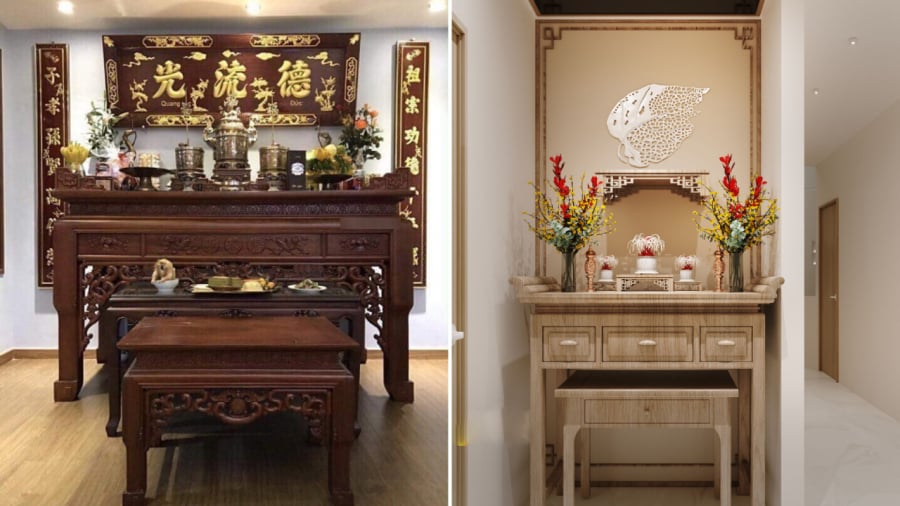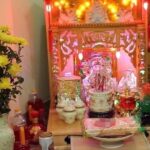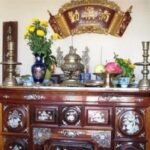In feng shui, the placement of an altar is of utmost importance and is believed to impact a family’s fortune and prosperity. Therefore, homeowners must pay close attention to the altar’s placement, adhering to feng shui principles.
Altar Placement: What Directions to Avoid
- Opposite to the House’s Orientation
According to feng shui beliefs, the house’s orientation is either the direction the house faces or a straight line perpendicular to the house’s center, extending to the front where the main entrance is located.
It is considered unfavorable to place the altar opposite to this orientation. Doing so creates a contrast between yin and yang energies, causing tension among family members, disharmony, and affecting the family’s finances. To rectify this, the only solution is to find a new location for the altar, taking into account the homeowner’s birth element and choosing a suitable direction accordingly.

- Altar Near the Kitchen or Bathroom
The altar should be placed in a clean and quiet area. Kitchens, on the other hand, have strong fire energy and cooking odors, which can impact the worship space negatively and affect the family’s fortune. Similarly, bathrooms are considered inauspicious due to the presence of dirty energy and unpleasant odors, disrupting the serenity and sanctity of the worship area.
It is also advisable not to place the altar directly opposite the kitchen or bathroom.
Additional Feng Shui Tips for Altars
- Keep the Space Under the Altar Clutter-Free
While it may be tempting to utilize the space under the altar for storage, doing so is not advisable as it can block the family’s financial luck. Additionally, clutter affects the aesthetics and cleanliness of the worship area.
It is also inadvisable to place items such as aquariums or electronic devices under the altar, as these can negatively impact the family’s fortune, according to modern feng shui beliefs.
- Maintain a Clean Altar
The altar represents respect and reverence for the deities and ancestors. Therefore, it is essential to keep it clean and free from any objects that may cause disruption. Regular cleaning and tidiness are crucial to maintaining the sanctity of the space.
- Avoid Moving the Altar Frequently
The altar should be placed in a fixed position, and any changes should be made thoughtfully. Before relocating the altar, it is customary to seek permission from the deities and ancestors by burning incense, as per feng shui and traditional beliefs, to avoid any disrespect.
These are some of the fundamental feng shui taboos regarding altar placement. As the altar holds a sacred position in the home, it is essential to follow these guidelines to avoid any negative impact on the family’s well-being and fortune.
Information is for reference only.
The Things You Should Never Place on an Ancestral Altar
The ancestral altar is a sacred spiritual corner in the home, a space for offering gratitude and respect to one’s ancestors. According to traditional feng shui, the placement of objects on the altar is of utmost importance, as even a slight misstep can disrupt the harmony of the home and impact family dynamics and fortune.
Where Should the Flower Vase Be Placed on the Ancestral Altar: Left or Right? Many Families Are Doing It Wrong and Losing Their Luck.
“Arranging an altar can be a daunting task, especially when it comes to the placement of the flower vase – a small yet spiritually significant item. Many are unsure of the optimal layout for their altar, seeking a setup that not only looks pleasing but also aligns with Feng Shui principles. The vase’s position, though seemingly minor, holds a profound influence on the overall energy and harmony of the space.”



































